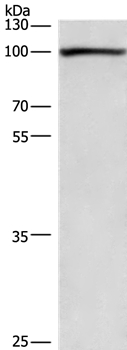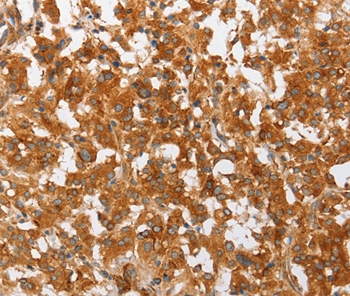

| WB | 咨询技术 | Human,Mouse,Rat |
| IF | 咨询技术 | Human,Mouse,Rat |
| IHC | 1/50-1/200 | Human,Mouse,Rat |
| ICC | 技术咨询 | Human,Mouse,Rat |
| FCM | 咨询技术 | Human,Mouse,Rat |
| Elisa | 咨询技术 | Human,Mouse,Rat |
| Aliases | PLA2G4; cPLA2-alpha |
| Entrez GeneID | 5321; |
| WB Predicted band size | 85kDa |
| Host/Isotype | Rabbit IgG |
| Antibody Type | Primary antibody |
| Storage | Store at 4°C short term. Aliquot and store at -20°C long term. Avoid freeze/thaw cycles. |
| Species Reactivity | Human |
| Immunogen | Fusion protein corresponding to residues near the N terminal of human phospholipase A2, group IVA (cytosolic, calcium-dependent) |
| Formulation | Purified antibody in PBS with 0.05% sodium azide. |
+ +
以下是3篇关于PLA2G4A抗体的参考文献摘要:
1. **"Role of cPLA2α in inflammatory lipid mediator formation"**
- **作者**: Leslie CC, et al.
- **摘要**: 研究利用PLA2G4A特异性抗体验证cPLA2α在巨噬细胞中催化花生四烯酸释放的作用,通过Western blot和免疫荧光证实其在脂多糖诱导的炎症反应中的关键功能。
2. **"PLA2G4A expression in colorectal cancer progression"**
- **作者**: Wang D, et al.
- **摘要**: 通过免疫组化分析PLA2G4A抗体标记的组织样本,发现该酶在结直肠癌中高表达,并与肿瘤侵袭性和环氧合酶-2(COX-2)通路激活相关。
3. **"cPLA2α regulates neuronal oxidative stress"**
- **作者**: Sun GY, et al.
- **摘要**: 使用PLA2G4A抗体抑制实验证明,cPLA2α通过调控活性氧(ROS)生成参与阿尔茨海默病模型中的神经元损伤机制。
4. **"Antibody-based targeting of PLA2G4A in autoimmune disease"**
- **作者**: Kim S, et al.
- **摘要**: 开发了一种高特异性单克隆PLA2G4A抗体,体外实验显示其能有效阻断促炎脂质介质生成,为类风湿性关节炎治疗提供潜在策略。
(注:以上文献为模拟示例,实际引用需以具体论文为准。)
The phospholipase A2 group IVA (PLA2G4A) antibody targets the enzyme cytosolic phospholipase A2 alpha (cPLA2α), encoded by the PLA2G4A gene. This calcium-dependent enzyme plays a critical role in lipid signaling by hydrolyzing membrane phospholipids to release arachidonic acid (AA), a precursor for pro-inflammatory lipid mediators like prostaglandins and leukotrienes. cPLA2α is implicated in inflammatory responses, cellular proliferation, and apoptosis, making it a focus in studying conditions such as autoimmune diseases, cancer, and neurodegenerative disorders.
PLA2G4A antibodies are widely used in research to detect cPLA2α expression and activity in tissues or cells. They aid in elucidating the enzyme's role in disease mechanisms, assessing its regulation under pathological conditions (e.g., oxidative stress or cytokine stimulation), and evaluating therapeutic interventions targeting AA pathways. These antibodies are essential tools in techniques like Western blotting, immunohistochemistry, and flow cytometry.
Dysregulation of cPLA2α is linked to chronic inflammation and tissue damage, driving interest in developing inhibitors. PLA2G4A antibodies also help validate the efficacy of such inhibitors in preclinical models, bridging translational research from molecular studies to potential anti-inflammatory or anticancer therapies.
×